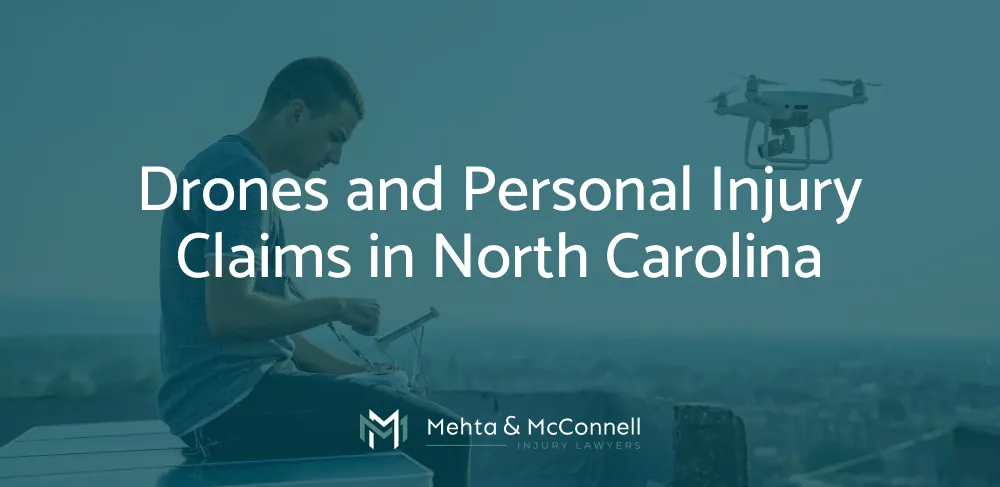 Personal Injury
Personal Injury
Drone technology has become increasingly prevalent, from recreational use in capturing breathtaking aerial views to commercial applications like delivery services and roof inspections. However, along with the convenience and excitement they offer, drones also bring potential injury risks.
If you’ve been involved in a drone-related incident in North Carolina, understanding your rights and legal options is crucial, especially if you have sustained compensable drone injuries.
Understanding Drone Laws in North Carolina
North Carolina has specific laws and statutes governing the use of drones, particularly concerning private airspace. These laws ensure individuals’ safety and privacy while allowing for the responsible use of drones.
For instance, the law generally prohibits drones from flying over private property without permission, and there are restrictions on flying drones near airports, emergency response activities, and critical infrastructure.
In North Carolina, the use of drones is regulated by state laws and federal regulations from the Federal Aviation Administration (FAA). These regulations are important to know if you are operating a drone or if you are wondering if you have a cause of action against a drone operator. Here are some key North Carolina statutes governing the use of drones:
- NC Gen. Stat. § 15A-300.1 – Unauthorized Surveillance with Unmanned Aircraft Systems (UAS): This statute prohibits the use of drones for unauthorized surveillance. It specifies that a person commits an offense if they intentionally use a drone to conduct surveillance of another person without their consent.
- NC Gen. Stat. § 63-95 – Operation of Unmanned Aircraft Systems (UAS) Near Airports and Other Facilities: This statute regulates the operation of drones near airports, critical infrastructure facilities, and public safety events. It imposes restrictions on flying drones in these areas and others to ensure aviation safety and security.
- NC Gen. Stat. § 14-401.24 – Offense of Interfering with the Operation of an Unmanned Aircraft System: This statute makes it an offense to interfere with the operation of a drone in certain circumstances. It prohibits actions such as shooting, damaging, or disrupting the operation of a drone, with penalties for violations.
These statutes and FAA regulations aim to ensure the safe and responsible use of drones while addressing privacy concerns, aviation safety, and protection of critical infrastructure. Drone operators and enthusiasts need to be aware of these laws to avoid legal issues and promote responsible drone usage.
Common Types of Drone Injuries
Drone accident injury can occur in various ways, most of which involve operator error or mechanical malfunction, with some of the most common types including:
- Impact injuries. When a drone collides with a person, it can cause cuts, bruises, or more severe injuries, depending on the size and speed of the drone.
- Propeller injuries. Drones with rotating propellers pose a significant risk, especially if they come into contact with unprotected body parts.
- Crash injuries. Malfunctions or operator errors can lead to drone crashes, potentially causing injuries to bystanders or property damage.
Understanding why drone injuries occur is crucial for preventing such incidents and ensuring safe drone operation. Knowing how and why the accident happened can also inform who is liable and how much compensation is owed.
Compensation for a Drone Accident
If you’ve suffered injuries due to a drone accident, you may be entitled to compensation. Types of compensation for drone injuries may include:
- Medical expenses—coverage for medical bills related to drone-related injuries, including hospitalization, surgery, medication, and rehabilitation.
- Lost income—compensation for lost wages if your injuries result in missed work or reduced earning capacity.
- Pain and suffering—damages for physical pain, emotional distress, and reduced quality of life caused by the drone incident.
- Property damage—reimbursement for damage to personal property caused by a drone.
If you’ve been injured by a drone, it’s important to consult with an experienced personal injury lawyer, like the ones at Mehta & McConnell, to understand your rights and pursue fair compensation.
Statute of Limitations
In North Carolina, the statute of limitations for personal injury cases is three years from the date of the injury. It’s important for individuals who have suffered injuries from drones to be aware of this statute of limitations to ensure they take timely legal action if they wish to pursue compensation for their injuries. Waiting longer than three years may result in losing the right to file a personal injury lawsuit.
Contact Mehta & McConnell
At Mehta & McConnell Injury Lawyers, we understand the complexities of drone-related personal injury claims in North Carolina. Our compassionate and knowledgeable legal team is here to provide the representation you need.
If you’ve been injured by a drone or have concerns about liability involving drones, don’t hesitate to reach out to us for a confidential consultation. Our team can walk you through the legal process from beginning to end and answer any questions you may have. Take the first step in getting the compensation you deserve today.


